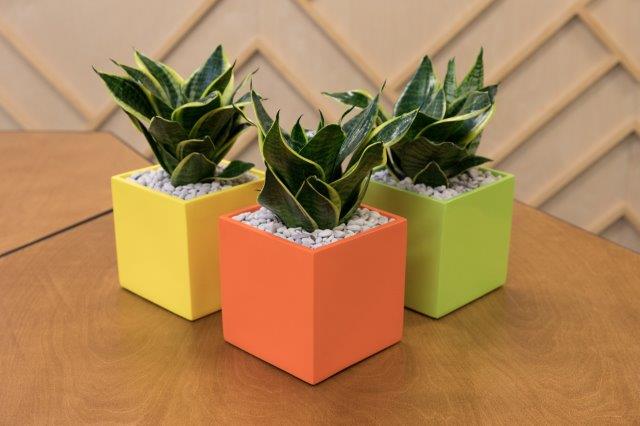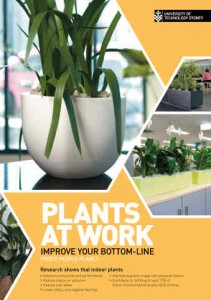

UTS Plants at Work Brochure, Page 1.
The University of Technology Sydney (UTS) also produced a poster for the event.
It has a similar theme but gives a scientific slant and more importantly includes a Selected Bibliography covering researchers and their papers.
This 4-page brochure covers Indoor Environment Quality and how plants contribute to over 75% of the criteria.
This is Version 3 and has been updated with the latest research.
Download – The UTS Indoor Plants Work Brochure V3.1
The triple bottom line (TBL) refers to a how a corporation deals with and reports on its impact and behaviour in respect to people, planet and profit.
It reflects a corporation’s greater transparency and accountability in its public reporting, communication and disclosure in regard to how the corporate entity performs in:
While there is no single universally accepted definition of TBL reporting, in a sentence is defined as corporate communication with stakeholders that describes the company’s approach to managing economic, environmental and social dimensions of its activities.
In terms of:
Download -Profit – People – Planet
The Australia Green Property Investment Index released by IPD this month shows positive results for the owners of Green Star-certified offices.
In the year to June 2013, the Green Star market delivered higher investment returns and lower capitalisation rates than the broader office market. Overall, cap rates for Green Star buildings are at 7.3% p.a, in comparison to the broader office market at 7.5% p.a. 6 Star Green Star offices delivered the best cap rate results at 6.8% p.a.
Green Star offices continue to outperform the rest of the office market delivering a 10.8% annualised total return result, in comparison to the rest of the office market at 9.4%.
Prof. Margaret Burchett represented NIPA at Ideaction 2010 in Perth.
Rather than take a booth NIPA chose to develop a poster which could be used after the event.
The poster is attached to a wall, the owner stands near and talks to passers-by.
Profit – People – Planet Poster – Download
The truth about indoor air quality and how plants really clear the air and calm the mind
Over 80% of Australians live in urban areas, spending 90% of their time indoors at work, school or in the home. Health costs of urban air pollution (UAP) is estimated by CSIRO at about $12 billion per annum, and NSW Health estimates UAP causes up to 2000 deaths each year in the Sydney metropolitan area alone.
Did you know that indoor air pollution is 2-10 times higher than the outdoors or that indoor plants reduce symptoms such as headaches, sore eyes, loss of concentration and feelings of depression? Indoor air is high in CO2 with harmful pollutants emitted from indoor ‘plastic’ or ‘synthetic’ furniture, furnishings and equipment like computers, copiers and solvents.
Professor Margaret Burchett and Dr Fraser Torpy report UTS research findings that prove how efficiently indoor plants can remove pollutants, cleanse stale air and reduce symptoms such as headaches, sore eyes, loss of concentration and feelings of ‘stuffiness’. Discover the health benefits associated with the presences of indoor plants in raising spirits, reducing feelings of stress or fatigue and improving work productivity and performance.
About the speakers
Professor Margaret Burchett is a plant environmental toxicologist, with research interests in the benefits of plants in urban areas – their responses to pollution and their capacities to reduce and remediate pollution. Over the last 15 years, she has led research in the UTS Plants and Indoor Environmental Quality Group focusing on the uses of potted-plants to reduce urban indoor air pollution and promote health and wellbeing for building occupants.
Dr. Fraser Torpy is a microbial ecologist and biostatistician who has worked alongside Professor Burchett in the UTS Plants and Indoor Environmental Quality Group for over a decade. His primary research interests are the microbial and ecophysiological processes involved with the potted-plant effects on indoor air quality and the analysis of ecological data.
More interesting reading from UTS.